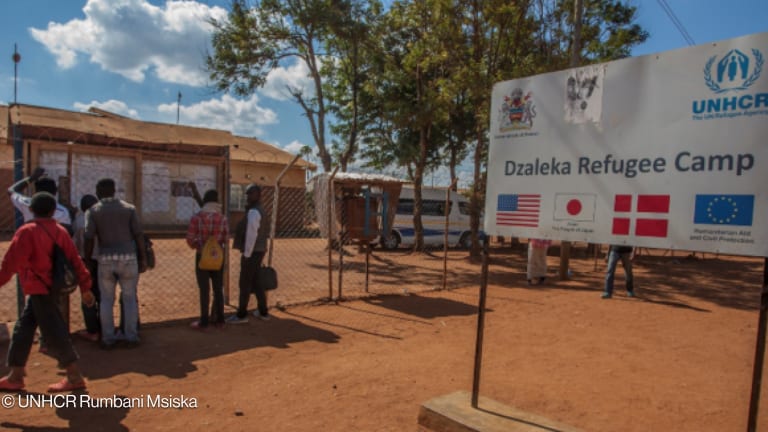
When I came to the U.S. from Iraq in 2010, I didn't imagine that I would one day be addressing a body of the United Nations. I fled my home country as a refugee due to the conflict there, after my husband started receiving death threats for working with an American company. I arrived in the U.S. with only a pocket Quran in my hand, given to me by my mother.
People like me often do not have the opportunity to influence global refugee policy. But this has started to change. When the U.N. General Assembly affirmed the Global Compact on Refugees in 2018, it recognized that “responses are most effective when they actively and meaningfully engage those they are intended to protect and assist.”
People with lived experience of forced displacement can impact policy for the better.
—Canada first included a refugee adviser in its delegation to a global meeting on refugees in 2019. Since then, Refugees Seeking Equal Access at the Table, or R-SEAT, has been working with other countries to develop mechanisms that enhance the global refugee response system through the promotion of meaningful and substantial refugee participation in global policy discussions.
That's why it was so significant when the United States of America included me as an official expert member on their delegation to the October 2022 meeting of the U.N. High Commissioner for Refugees Executive Committee. The U.S. is the single largest donor to UNHCR and has considerable influence in global meetings on refugees. My participation in their delegation showed how refugees can have real influence in the decision-making that affects our lives.
I participated in the delegation as a member of the U.S. Refugee Advisory Board, USRAB. I delivered part of the U.S. statement during the plenary session, and I actively participated in the work of the U.S. delegation during the weeklong meeting. In my statement, I told the assembled states and UNHCR that if we want to solve the global refugee crisis in a durable way, we need to bring the voices of refugees, asylees, and other forcibly displaced people to the policy arenas where they are most needed.
People with lived experience of forced displacement can impact policy for the better. USRAB is an innovative initiative led by a diverse group of eight such individuals. In the past, international policymakers haven't engaged enough with people like me. They designed policies and programs that have influenced refugees, asylees, and other forcibly displaced people without talking to us enough, if at all.
Beyond the policymaking arena, in our daily lives, forcibly displaced people face barriers to accessing training on refugee policy and advocacy, and frequently encounter misconceptions about the many contributions we make to local, state, national, and global communities.
We created USRAB as an advisory board to address these barriers. Launched with the support of R-SEAT and in partnership with Refugee Congress, Refugee Council USA, and Georgetown University’s Institute for the Study of International Migration, it has been co-designed with a team of refugee and asylee academics, practitioners, and policy experts.
It will serve to channel the participation of current and former forcibly displaced people in the U.S. into relevant regional and international policy bodies, ensuring that refugees have a say in policies affecting us. We believe that engaging and recognizing the power of those with lived experience in displacement will lead to better and more effective humanitarian protection programs and solutions.
Promises and pledges: Has the Global Compact on Refugees delivered?
Three years on from its inception, advocates say progress and follow through on commitments to the Global Compact on Refugees has been slow.
With the USRAB launch, in coordination with the U.S. Department of State, I am confident that the expertise of refugee leaders can and will lead to more effective policies and programs. As more states adopt mechanisms to support refugee participation and as more states include refugees in their delegations to global refugee meetings, global refugee responses will become more accountable and legitimate, and — ultimately — more effective.
I hope my remarks and participation at the UNHCR Executive Committee meetings inspired its collective will to create similar opportunities for meaningful engagement and partnership for refugee leaders across the world. I am optimistic about a future where this is a reality. I only spoke for a few minutes, but the response was humbling.
Many countries said it was good to see the United States stepping up and making refugee participation so meaningful. Filippo Grandi, the United Nations high commissioner for refugees, celebrated the moment, saying it was a “changing moment in history.” He invited other governments to do the same and follow the North American lead.
After that, I saw many governments reaching out to the U.S. delegation and applauding the action. Several other countries echoed the U.S. sentiments and said they plan to follow this example and recognize the power of those with lived experience of forced displacement.
It is good to see the U.S. demonstrating such global leadership in this international area. Likewise, I call on refugees to collaborate strategically with their host governments. Together we can shape the way in which our issues, refugee issues, are addressed. Long may it continue.








